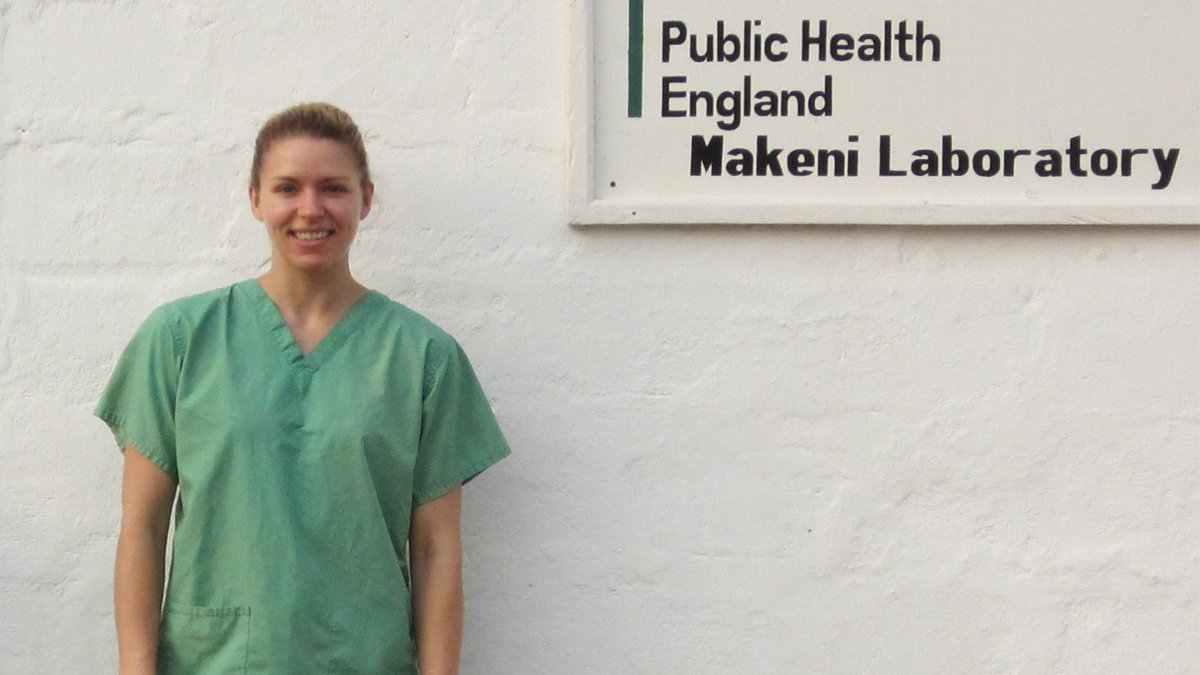Testing for coronavirus on the frontlines
Emma Wise is a Research Fellow at the University of Surrey, studying herpesviruses, a family of DNA viruses that cause infections and diseases in people and animals. She’s currently supporting the NHS with coronavirus (Covid-19) testing at Basingstoke and North Hampshire Hospital.

In 2015, Emma conducted diagnostic testing for Ebola virus at the Makeni Ebola Treatment Centre in Sierra Leone.
When do you first remember hearing about Covid-19?
I first heard about Covid-19 around the beginning of January, when reports started to appear about a respiratory illness in China with an unknown cause. At the time, I was putting the finishing touches to my PhD thesis and preparing to start at Surrey as a Research Fellow. Although it was on my radar, it wasn’t something I was thinking about a lot.
What inspired you to give your time to help with the Covid-19 pandemic?
Five years ago, I travelled to Sierra Leone to assist with Ebola virus testing, giving me first-hand experience of an epidemic and its impact on communities. I previously conducted research around emerging and neglected viral diseases, like Covid-19. In my PhD, funded by Public Health England, I carried out research to improve the detection of viral infections in patients with a fever but no diagnosis.
I feel lucky to have the first-hand experience and lab skills needed to be able to assist the NHS at a time when many people feel powerless; volunteering to help was a natural decision. I’m very grateful to my colleagues and friends at Surrey who have supported my decision.
How are you helping at Basingstoke and North Hampshire Hospital?
I’m carrying out testing for severe acute respiratory syndrome coronavirus 2 (SARS-CoV-2), the virus that causes the respiratory illness, better known as Covid-19. Working alongside a team of biomedical scientists and volunteers, including my colleague Dr Bryony Armson, I process swabs and perform testing to determine whether patients are positive for Covid-19. This information allows doctors to segregate patients appropriately and reduce the risk of spread within the Hospital. We also test symptomatic staff - those who test negative for Covid-19 can return to work sooner and continue to care for patients.
In addition to performing testing, we’re establishing a link with the Covid-19 Genomics UK Consortium (COG-UK), who perform rapid SARS-CoV-2 viral genome sequencing from patient samples. This data will help scientists understand the spread of Covid-19 and could guide treatment and vaccine development.
Can you tell us about your experience during the Ebola outbreak?
In 2015, I travelled to Sierra Leone for eight weeks to provide Ebola virus testing for patients in treatment centres and the wider community. I was part of a 16-person team that worked in the Makeni Ebola Treatment Centre in the Northern Province. This team included Stephen Kidd, who is the Clinical Scientist leading the SARS-CoV-2 testing efforts at Basingstoke and North Hampshire Hospital.
My time in Sierra Leone taught me that people are incredibly resilient; whilst the Ebola outbreak was at times very difficult, with many people losing loved ones to the disease or suffering themselves, people do always pull together in times of crisis. This is something that we are seeing again during the Covid-19 pandemic.
What’s your message to all of us?
Please keep up-to-date with Government advice and follow it. Remember that although we don’t know when normality will resume, this is temporary. Think about the bigger picture and realise that by minimising contact with other people, you really are saving lives. There are many positive stories of people helping each other and I think it’s very inspiring to focus on these when things seem bleak.
When recently discussing the ‘grey-areas’ of social distancing measures, my partner said to me: “In 20 years, when your family looks back and asks what you did during the 2020 pandemic, what do you want to be able to tell them?”
I think it’s a question that we should all ask ourselves; it’s a good way of seeing the bigger picture and identifying the right thing to do.
Play your part in stopping the spread of coronavirus by following official NHS advice and keep up-to-date with the latest Government coronavirus information.
Find out more about our virology research in the School of Biosciences and Medicine.